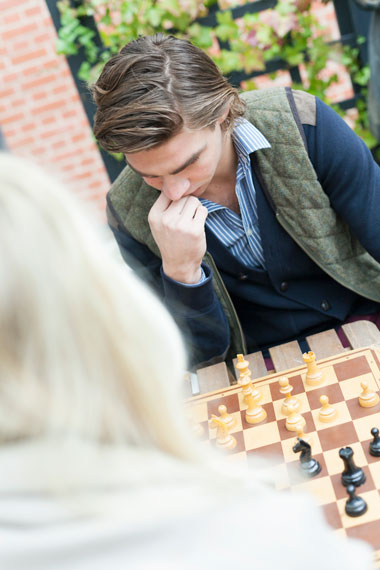Closely related to attention, concentration is directly responsible for the functioning of cognitive processes, such as memory, learning, problem solving, and consequently our productivity as individuals.
Concentrate!
A quiet Sunday afternoon in the Ionescu family living room. Mum and Dad share an apple tart with a Cafe Latte fresh from the espresso machine they bought on Black Friday. They’re not quite sure if they got it at the best possible price, but since they needed it anyway, they decided to get over the doubt of a 40% discount and bought it.
A little further away from their table, on the carpet, the family’s youngest son is sprawled out in front of the 120 cm TV, watching the cartoon film on Netflix.
“Michael, pick up the toys on the floor, if you don’t need them anymore,” says Dad, trying to mobilise the little boy,
but there is no sign of his parent from in front of the TV, as if the adult’s words have flown into the ether and pulverised into microscopic particles incapable of moving anything in the little boy’s being, who gives the impression of being immersed in the world of animated characters.

„”Didn’t you hear what dad said?”, says mum as she touches him lightly on the shoulder, wanting to make physical contact to emphasise the message.
Michael is completely absorbed in the work he is doing, sitting alone under an imaginary dome, inside which there is no transfer of information with the external environment.
The ability of the individual to voluntarily channel his attention to a stimulus of interest to him.
As we grow older it becomes more and more difficult for us to select, filter and channel our interest to those external stimuli that are relevant to the performance of our current tasks.
Perhaps it is also because the masses are becoming more numerous, or perhaps it is because our physical capacity to perform cognitive activities is decreasing.
Whatever the reason, reality shows us that in adulthood, both for outstanding performance and for routine activities during intense periods, we need exercise and concentration enhancers.
The greater the quantity of stimuli from which we need to select those of interest, and the more intense the stimuli that disturb our cognitive processes, the more we need to develop and support our ability to concentrate.
Binding cognitive processes

Even though we can consider it a neurocognitive process, concentration should be seen as the binder of cognitive processes.
he prefrontal cortex of the cortex, which is involved in the motivational system, is responsible for the way we focus on a set of stimuli relevant to our personal goals.
We can train our concentration and identify in the environment which signals to follow, but the key to success is to maintain concentration for a long period of time until the desired result is achieved.
Let’s take the example of chess. The player can be trained to concentrate on the battle space, represented by the black and white squares, to follow the relationships between the figures, their co-operation, but will he be able to maintain this effort for two hours?
Time in chess is measured in moves, not seconds, so a game is either short or long, depending on the number of troop moves that each army makes on the battlefield.
The leader of the troops, the player, needs to maintain concentration for at least 40 uninterrupted moves, which can take as long as 5 hours.
This challenge is independent of the performer’s external environment, despite the custom that “it takes silence to concentrate”.
Without excessive external stimuli, or with stimuli lacking in intensity, concentration will be an infinitely easier task.
By stabilising attention for a longer period of time we will also achieve an improvement in memory, both in the short and long term.
Improves concentration
The preoccupation with improving the ability to concentrate is natural, since every individual wants to be more productive and achieve exceptional results in their profession, at school, or in sports arenas, and the environment in which they perform contains varied stimuli.
It can be said that a strong mind is directly proportional to the way in which the cognitive functions as a whole are utilised, which is lubricated by the ability to concentrate.
The development of this function is equally dependent both on practising specific exercises and on maintaining a healthy lifestyle with an adequate diet.
Chess is a pretext for practising and developing concentration, thanks to its specific mechanics, which set it apart from other boardgames.

Pentru players are forced to devote their entire cognitive capacity to keeping an eye on a 60 cm square in order to control the dynamics of elements governed by abstract rules.
It is not easy to keep a constant eye on the interaction between a figure moving along diagonal lines and one moving along vertical and horizontal lines, not just any old way, but with a specific objective in mind, namely to capture the opponent’s flag, represented by the King.
The gains made by playing this game in a controlled environment are transferred to other areas of activity.
Supplements containing Vitamin B Complex and magnesium are extremely useful in improving the diet, providing real nutritional support for optimal brain function.